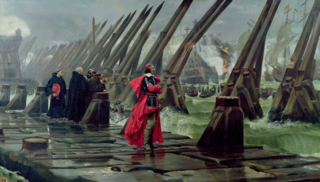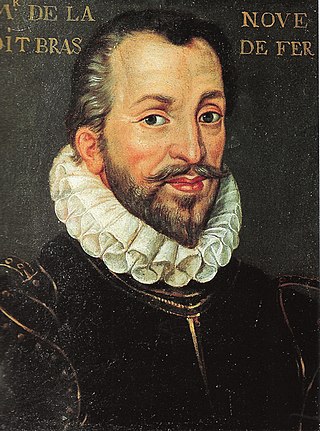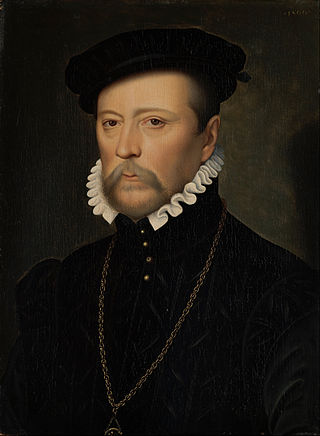Battle of La Rochelle or Siege of La Rochelle may refer to:

Charles IX was King of France from 1560 until his death in 1574. He ascended the French throne upon the death of his brother Francis II in 1560, and as such was the penultimate monarch of the House of Valois.

La Rochelle is a city on the west coast of France and a seaport on the Bay of Biscay, a part of the Atlantic Ocean. It is the capital of the Charente-Maritime department. With 75,735 inhabitants in 2017, La Rochelle is the most populated commune in the department and ranks fifth in the New Aquitaine region after Bordeaux, the regional capital, Limoges, Poitiers and Pau. Its inhabitants are called "les Rochelaises" and "les Rochelais".

The French Wars of Religion is the term which is used in reference to a period of civil war between French Catholics and Protestants, commonly called Huguenots, which lasted from 1562 to 1598. According to estimates, between two and four million people died from violence, famine or diseases which were directly caused by the conflict; additionally, the conflict severely damaged the power of the French monarchy. The fighting ended in 1598 when Henry of Navarre, who had converted to Catholicism in 1593, was proclaimed Henry IV of France and issued the Edict of Nantes, which granted substantial rights and freedoms to the Huguenots. However, Catholics continued to have a hostile opinion of Protestants in general and of Henry, and his assassination in 1610 triggered a fresh round of Huguenot rebellions in the 1620s.
The War of the Three Henrys, also known as the Eighth War of Religion, took place during 1585–1589, and was the eighth conflict in the series of civil wars in France known as the French Wars of Religion. It was a three-way war fought between:

The siege of La Rochelle was a result of a war between the French royal forces of Louis XIII of France and the Huguenots of La Rochelle in 1627–28. The siege marked the height of the struggle between the Catholics and the Protestants in France, and ended with a complete victory for King Louis XIII and the Catholics.

François de la Noue, called Bras-de-Fer, was one of the Huguenot captains of the 16th century. He was born near Nantes in 1531, of an ancient Breton family.

The siege of Sancerre (1572–1573) was a siege of the fortified hilltop city of Sancerre in central France during the Wars of Religion where the Huguenot population held out for nearly eight months against the Catholic forces of the king.

The Battle of La Rochelle was a naval battle fought on 22 and 23 June 1372 between a Castilian fleet commanded by the Castilian Almirant Ambrosio Boccanegra and an English fleet commanded by John Hastings, 2nd Earl of Pembroke. The Castilian fleet had been sent to attack the English at La Rochelle, which was being besieged by the French. Besides Boccanegra, other Castilian commanders were Cabeza de Vaca, Fernando de Peón and Ruy Díaz de Rojas.
Montmirail may refer to:

The siege of La Rochelle of 1572–1573 was a massive military assault on the Huguenot city of La Rochelle by Catholic troops during the fourth phase of the French Wars of Religion, following the August 1572 St. Bartholomew's Day massacre. The conflict began in November 1572 when inhabitants of the city refused to receive Armand de Gontaut, baron de Biron, as royal governor. Beginning on 11 February 1573, the siege was led by the Duke of Anjou. Political considerations following the duke's election to the throne of Poland in May 1573 resulted in negotiations, culminating on 24 June 1573, that lifted the siege on 6 July 1573. The Edict of Boulogne signed shortly thereafter brought an end to this phase of the civil war.
The Battle of Los Angeles was an anti-aircraft artillery barrage in February 1942 over Los Angeles, California, in response to a perceived attack on the continental United States by Imperial Japan, subsequently attributed to a case of "war nerves" likely triggered by a lost weather balloon.

François de Scépeaux de Vieilleville, lord of Vieilleville, 1st comte of Durtal, was a French governor, diplomat, ambassador, conseillé du roi and marshal. During his career, he would serve four French kings. He fought throughout the later years of the Italian Wars, acquiring for himself the key frontier governorship of Metz in 1553. Under King Charles IX he would be elevated to marshal and would serve the crown in the early religious wars, increasingly in the role of peacemaker and diplomat, though with scattered military service as with the recapture of Le Havre in 1563. He died in 1571, shortly before France would be shaken by the St Bartholomew's Day Massacre.

The Recovery of Ré Island was accomplished by the army of Louis XIII in September 1625, against the troops of the Protestant admiral Soubise and the Huguenot forces of La Rochelle, who had been occupying the Island of Ré since February 1625 as part of the Huguenot rebellions.

The Huguenot rebellions, sometimes called the Rohan Wars after the Huguenot leader Henri de Rohan, were a series of rebellions of the 1620s in which French Calvinist Protestants (Huguenots), mainly located in southwestern France, revolted against royal authority. The uprising occurred a decade after the death of Henry IV who, himself originally a Huguenot before converting to Catholicism, had protected Protestants through the Edict of Nantes. His successor Louis XIII, under the regency of his Italian Catholic mother Marie de' Medici, became more intolerant of Protestantism. The Huguenots tried to respond by defending themselves, establishing independent political and military structures, establishing diplomatic contacts with foreign powers, and openly revolting against central power. The Huguenot rebellions came after two decades of internal peace under Henry IV, following the intermittent French Wars of Religion of 1562–1598.

The Blockade of La Rochelle took place in 1621-1622 during the repression of the Huguenot rebellion by the French king Louis XIII.

The Battle of Blavet was an encounter between the Huguenot forces of Soubise and a French fleet under the Duke of Nevers in Blavet harbour, Brittany in January 1625, triggering the Second Huguenot rebellion against the Crown of France.
Events from the year 1622 in France.

The siege of Poitiers was a siege of the French city of Poitiers in summer 1569 as part of the French Wars of Religion. By that time the city was a Catholic stronghold faithful to Charles IX of France, though Jean Calvin had preached there in 1534 and it had taken the Protestant side from May to July 1563 before being recaptured by the Catholic Royalist party.
Poitiers is a city in France.